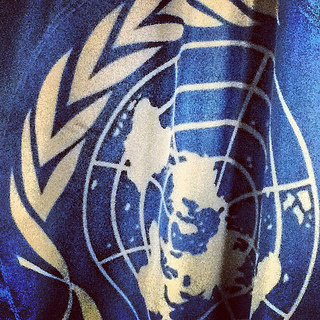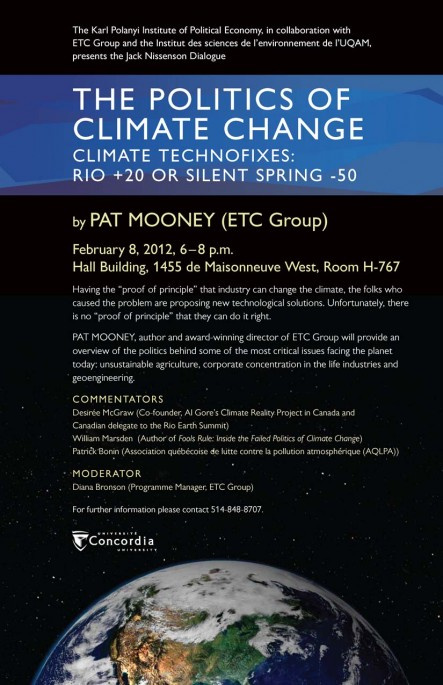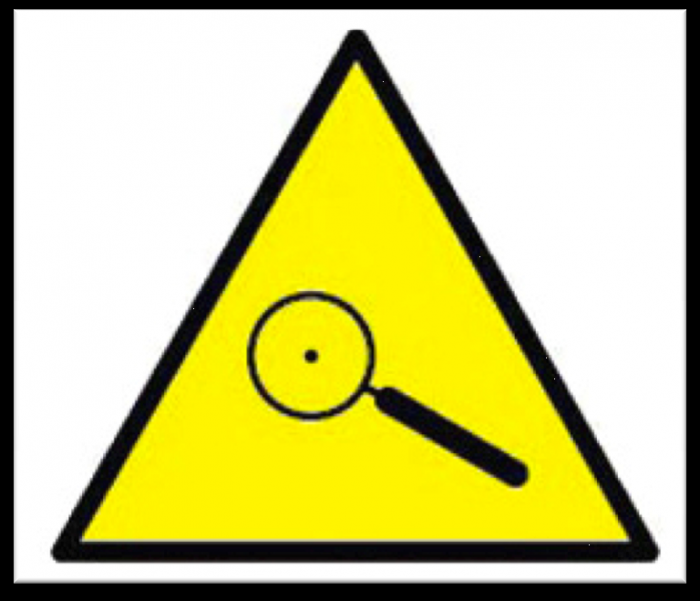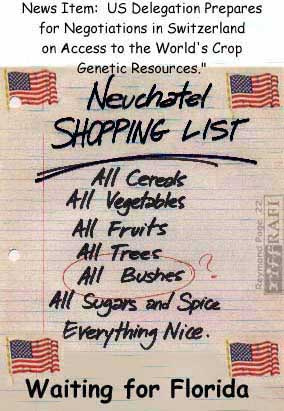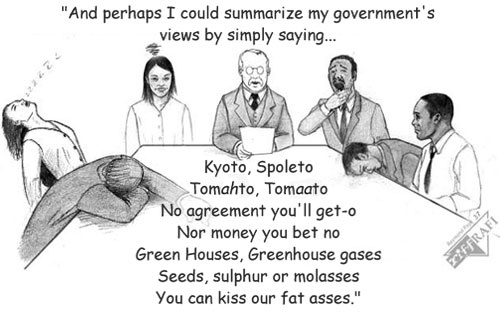Related Content
Bad Timing
Submitted by ETC Staff on
The timing is never right for technology assessment. It is always too soon, too late, too much, too fast or too slow. Here’s how the arguments go...
Risks
Submitted by ETC Staff on
An efficient, transparent pathway for technological advancement would save national governments time and money while reducing risk. Those proposing new technologies and their backers seek to minimize risk. Especially, re-insurers and investors welcome steps that make government intervention and/or public responses predictable.
It is said that no one can predict the past but had the UN maintained its monitoring capacity over the last two decades – and had civil society been vigilant – the world might have saved itself billions of dollars, millions of lives, and much time. Find in this briefing some post-Rio (1992) examples…
Moving Beyond Technology Transfer. The Case for Technology Assessment
Submitted by ETC Staff on
So-called “green technology” is now a major feature of the Rio+20 “green economy” vision. G-77 countries are, understandably, focused on facilitated access to useful technologies that can contribute to sustainable development; the best way to make sure the right technologies are transferred to the right places in the right way is to subject them to meaningful assessment. An emphasis on the positive potential of new technologies requires a concomitant emphasis on a strengthened global, regional and national capacity to monitor and assess technologies. Anything less will incite distrust and invite disaster. Powerful new technologies (such as nanotechnology, synthetic biology and geoengineering) are being proposed and promoted without prior evaluation and no regulation. If technology assessment is deemed too costly or time-consuming, we are likely to find that the cost of not assessing technologies is even greater.
Financial Report
Submitted by ETC Staff on
Distribute our Reports
ETC Group welcomes any opportunity for our materials to be more widely shared and disseminated. All of our materials are available online as PDF or similar ready for printing and copying. There is no fee or copyright for copying and distributing anything found on our website.
We encourage individuals and groups to:
The major battleground shaping up to Rio+20
Pat Mooney analyses the different threats to be addressed at Rio+20 in 2012 and the counter proposals global civil society and its allies could avance. Interview made at the World Social Forum in Dakar in February 2011 for "The commons on the global agenda" chapter in remixthecommons.org.
Offer Translations
ETC Group attempts to provide all of our writing, research and reports in English and Spanish. We also occasionally translate some of our materials into French and Portuguese.
From time to time individuals and groups contact us asking permission to translate some of our material into another language. We very much welcome these offers to voluntarily translate materials and ask only that ETC Group is credited as the original authors of the work. We would also appreciate a copy of any translations so that we can post them on our website to share more widely.
Costs
Submitted by ETC Staff on
Clean green technologies are at the center of the many special reports leading to Rio+20. Understandably, governments have focused on access to “know-how.” Since 1992, however, costly, resource-wasting experience has taught that “know-how” must be accompanied with “know-what” – assessment of the technology choices available – and “know-why” – a participatory analysis of socioeconomic and environmental needs a technology is to address.
Where and How
Submitted by ETC Staff on
Rio +20 can call for a UN-level technology facility (either combining or separately addressing the need for technology transfer and technology assessment), the details of which can be scheduled for final negotiation in the follow-through to the conference. Grounded in the Precautionary Principle, the facility would have the institutional capacity to identify and monitor significant technologies, including an evaluation of the technologies’ social, economic, cultural, health and environmental implications. Assessments would be completed before a new technology is released.
The Politics of Climate Change Dialogue
Submitted by ETC Staff on
Listen to Pat Mooney's Talk HERE at Rabble
Elevate Festival 2009 Interview with Pat Mooney
"I read somewhere, if you ask 100 scientiest for a definition of nanotechnology, you will get 100 different answers."
Elevate Festival 2009 Interview with Pat Mooney
ETC Group calls for the creation of an international technology evaluation and information mechanism to assess the health, environmental, economic and social impacts of new and emerging technologies.
Governments should adopt a process to develop an international technology evaluation and information mechanism – based on the Precautionary Principle – that will strengthen national sovereignty and build capacity, especially in the global South, to assess the health, environmental, economic and social impacts of new and emerging technologies such as biotechnology, nanotechnology and synthetic biology.
Financial Report
Submitted by ETC Staff on
Case Study: Star Anise
Submitted by ETC Staff on
This case study illustrates how a key pharmaceutical ingredient, shikimic acid – traditionally derived from star anise cultivated by Chinese farmers – can be rapidly replaced by a new technological production process. Using synthetic biology, shikimic acid is now being produced commercially in drug industry fermentation tanks. The transition took less than a decade. Shikimic acid is just one example of a raw material that may be affected; it is conservatively estimated that at least 50% of today’s commercial pharmaceutical compounds are derived from plants, animals and microorganisms. No inter-governmental body is addressing the potential impacts of synthetic biology on the conservation and use of biodiversity and on the livelihoods of those who depend on agricultural export commodities (including high-value flavors, fragrances, essential oils, etc). The Convention on Biological Diversity is the most appropriate forum to address this new and emerging issue.
Since 1992...
Submitted by ETC Staff on
It's not just that we are facing "something new", we are facing "something else". The speed, breadth and depth of technological change is out-pacing and out-scoping policymakers. Since 1992, the convergence of technologies (living and inert) at the atomic - or nano - scale is adding new dimensions to the nature of technological transformation. Governments need global tools to respond to "something else". Find in this briefing ten technology leaps making the case for prioritizing Technology Assessment at the UN.
Sound Science
Submitted by ETC Staff on
Does establishing a UN facility for technology assessment politicize science? Some agencies and treaties have subsidiary scientific bodies and some of these have been accused of allowing governments to interfere in their scientific work. However, one of the biggest changes since the 1992 Earth Summit has been the transformation of publicly-funded science to work in the service of private industry.
Crop genetic resources
Submitted by ETC Staff on
Kyoto, Spoleto
Submitted by ETC Staff on




